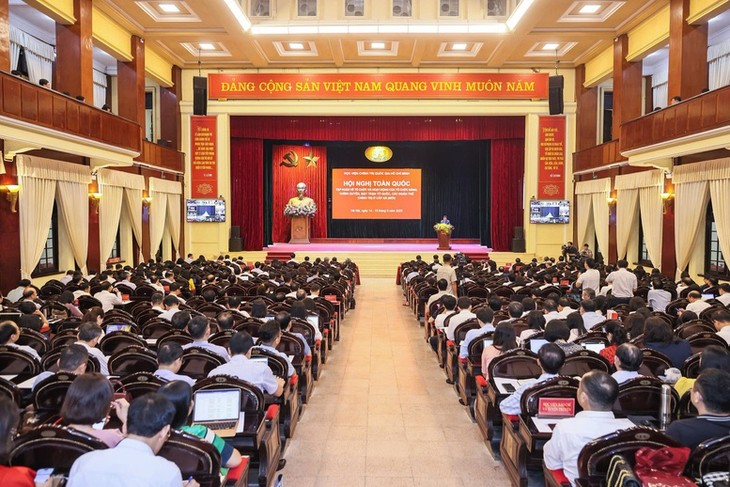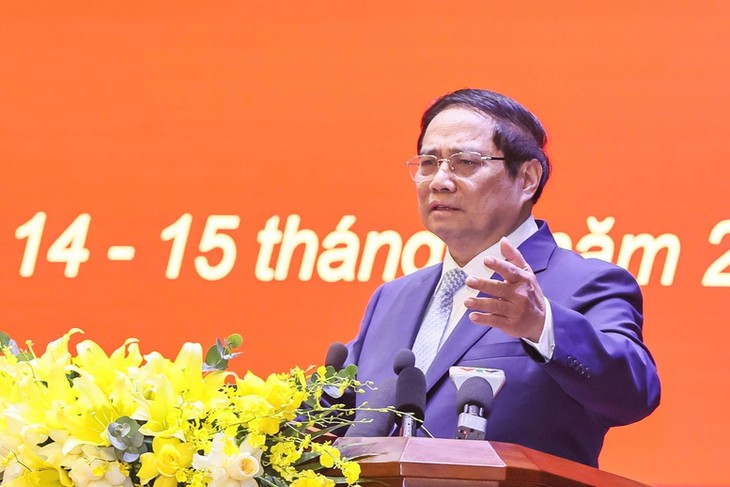(VOVWORLD) - A national training conference was held last weekend on the organization and functioning of Party bodies, local governments, the Vietnam Fatherland Front, and political-social organizations at the commune level. Addressing the conference, held to ensure the seamless operation of provincial and communal governments from July 1, following administrative mergers, Prime Minister Pham Minh Chinh emphasized that the core of the restructuring is transforming the administrative mindset from passively receiving and responding to public concerns to proactively serving the people and creating solutions.
 The conference is held in the hybrid format, drawing over 1.5 million delegates attending (Photo: VGP/Nhat Bac) The conference is held in the hybrid format, drawing over 1.5 million delegates attending (Photo: VGP/Nhat Bac) |
Vietnam’s apparatus restructuring aims to renew traditional growth drivers and ignite new ones. The government asked all localities to officially announce their two-tier local government by June 30, with full operations commencing on July 1.
From passive reception to proactive service
Prime Minister Pham Minh Chinh says the reform is a fundamental shift that creates a new development space and new growth drivers with greater scale and impact to transition the entire political system – including Party organizations, the government, the Vietnam Fatherland Front, and mass organizations – from a passive, reactive stance to a proactive, problem-solving, service-oriented model that actively supports citizens and businesses.
 Prime Minister Pham Minh Chinh speaks at the conference (Photo: Nhat Bac/VGP) Prime Minister Pham Minh Chinh speaks at the conference (Photo: Nhat Bac/VGP) |
Prime Minister Chinh said: “This is the most critical aspect of the reform, which reflects the aspirations of our people and has captured the attention of the international community. Southeast Asian countries, Gulf nations, and major global powers are all watching closely at a time when Vietnam has never had a stronger position or greater international credibility. People expect the outcomes of a revolution to have great socio-economic impacts.”
To serve the people effectively, Prime Minister Chinh said, the Party, government, and mass organizations must all strengthen their presence at the grassroots level, and officials must listen to the people, understand the people, and take prompt action aligned with public aspirations to provide better service and foster trust.
The Prime Minister said he hopes the the central government and the new two-tier local government system will reflect this new mindset.
“The central government will not be involved in direct execution. It will focus on building strategies, master plans, and plans, developing institutions and laws to manage and foster development, designing mechanisms and policies to mobilize resources, creating oversight tools to supervise and control power, and evaluating practical outcomes, drawing lessons, building theories, and replicating best practices,” said the Prime Minister.
Accelerating decentralization and delegation of authority
The Prime Minister stressed the need to decentralize and delegate authority to localities, calling it a clear expression of the “enabling government” model. Rather than exercising power at the central level, the State must delegate authority to local governments, who are closer to the people, understand local issues better, and can respond more quickly.
He said ministries and ministerial-level agencies have submitted 28 draft decrees on decentralization, authority delegation, and jurisdiction delineation in the justice, tax administration, public asset management, ethnic minority affairs, and religion sectors.
These decrees reflect a review of the scope of responsibilities and authority of ministries and local governments. The simultaneous issuance of 28 decrees is a historic attempt to create an efficient, citizen-friendly administrative model.
Experts believe that if successful, this will mark the beginning of a robust two-tier local governance model that will strengthen management at the grassroots level, where citizens interact directly with government.
The Communist Party of Vietnam has no goal other than national independence, sovereignty, territorial integrity, and improving the well-being and happiness of the people. The organizational reform of the political apparatus is expected to generate collective strength to drive national development and renewal.